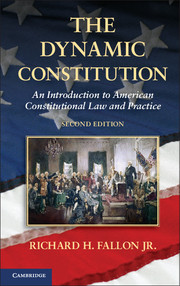Book contents
- Frontmatter
- Contents
- Preface to the Second Edition
- Preface to the First Edition
- Prologue: The Affordable Care Act and Other Vignettes
- Introduction
- Part I Individual Rights under the Constitution
- Part II The Constitutional Separation of Powers
- Part III Further Issues of Constitutional Structure and Individual Rights
- 10 Structural Limits on State Power and Resulting Individual Rights
- 11 The Constitution in War and Emergency
- 12 The Reach of the Constitution and Congress's Enforcement Power
- 13 Conclusion
- Appendix: The Constitution of the United States
- References
12 - The Reach of the Constitution and Congress's Enforcement Power
Published online by Cambridge University Press: 05 May 2013
- Frontmatter
- Contents
- Preface to the Second Edition
- Preface to the First Edition
- Prologue: The Affordable Care Act and Other Vignettes
- Introduction
- Part I Individual Rights under the Constitution
- Part II The Constitutional Separation of Powers
- Part III Further Issues of Constitutional Structure and Individual Rights
- 10 Structural Limits on State Power and Resulting Individual Rights
- 11 The Constitution in War and Emergency
- 12 The Reach of the Constitution and Congress's Enforcement Power
- 13 Conclusion
- Appendix: The Constitution of the United States
- References
Summary
[C]ivil rights, such as are guaranteed by the constitution against state aggression, cannot be impaired by the wrongful acts of individuals, unsupported by State authority.
– The Civil Rights Cases (1883)Congress does not enforce a constitutional right by changing what the right is. It has been given the power “to enforce,” not the power to determine what constitutes a constitutional violation.
– City of Boerne v. Flores (1997)THIS CHAPTER DEALS WITH THREE SEPARATE BUT RELATED issues concerning the nature and reach of constitutional rights. One involves the applicability of the Constitution: against whom does the Constitution create rights? Another has to do with the character of the rights that the Constitution creates. Nearly all are rights to be free from one or another kind of hostile governmental action. Few are rights to affirmative governmental assistance. Why? The final topic involves the scope of Congress's power to “enforce” constitutional guarantees. When making judgments about whether to enact legislation enforcing the Constitution, can Congress interpret the Constitution as creating rights that the Supreme Court would not recognize otherwise?
- Type
- Chapter
- Information
- The Dynamic ConstitutionAn Introduction to American Constitutional Law and Practice, pp. 335 - 352Publisher: Cambridge University PressPrint publication year: 2013

